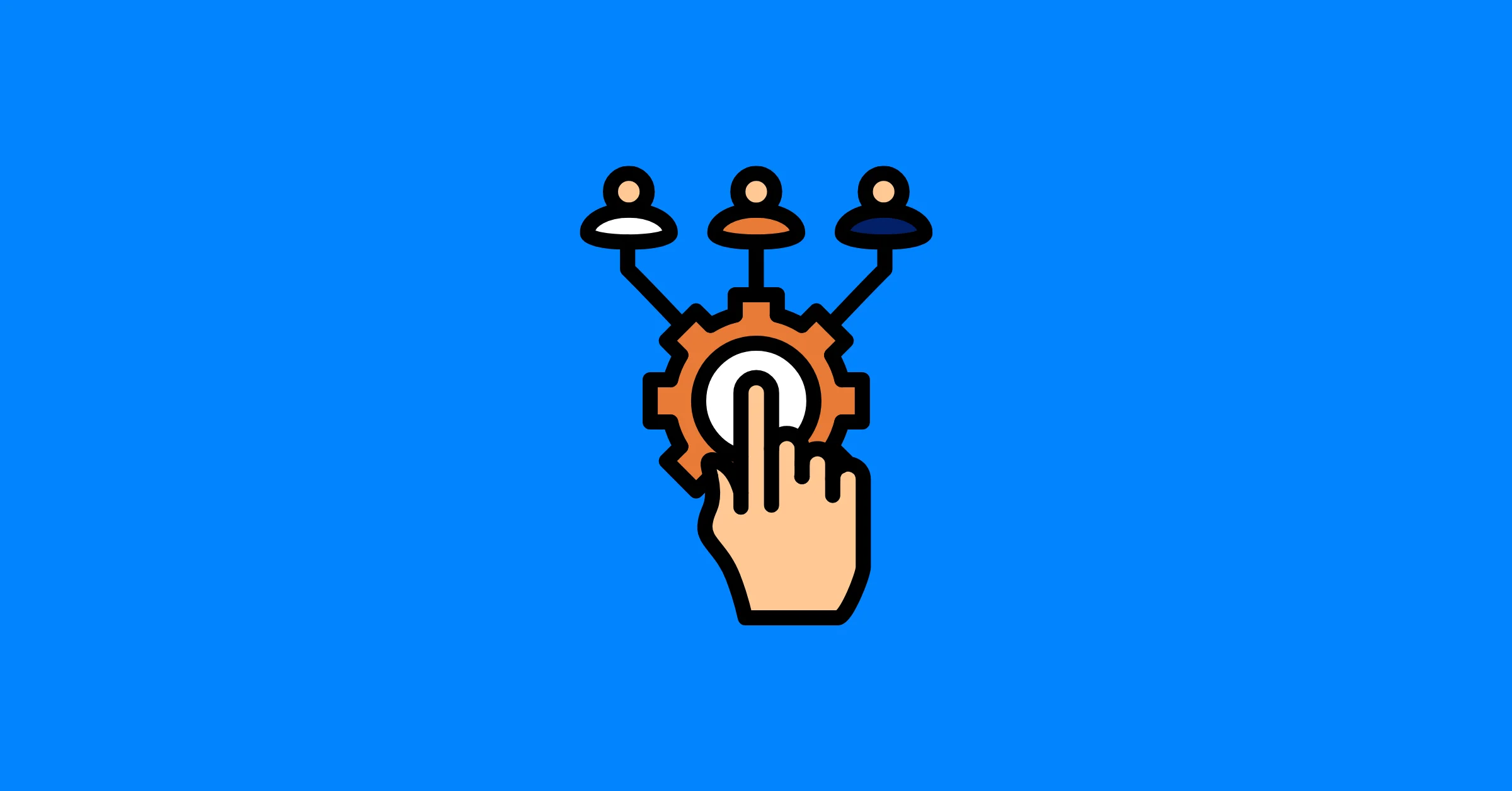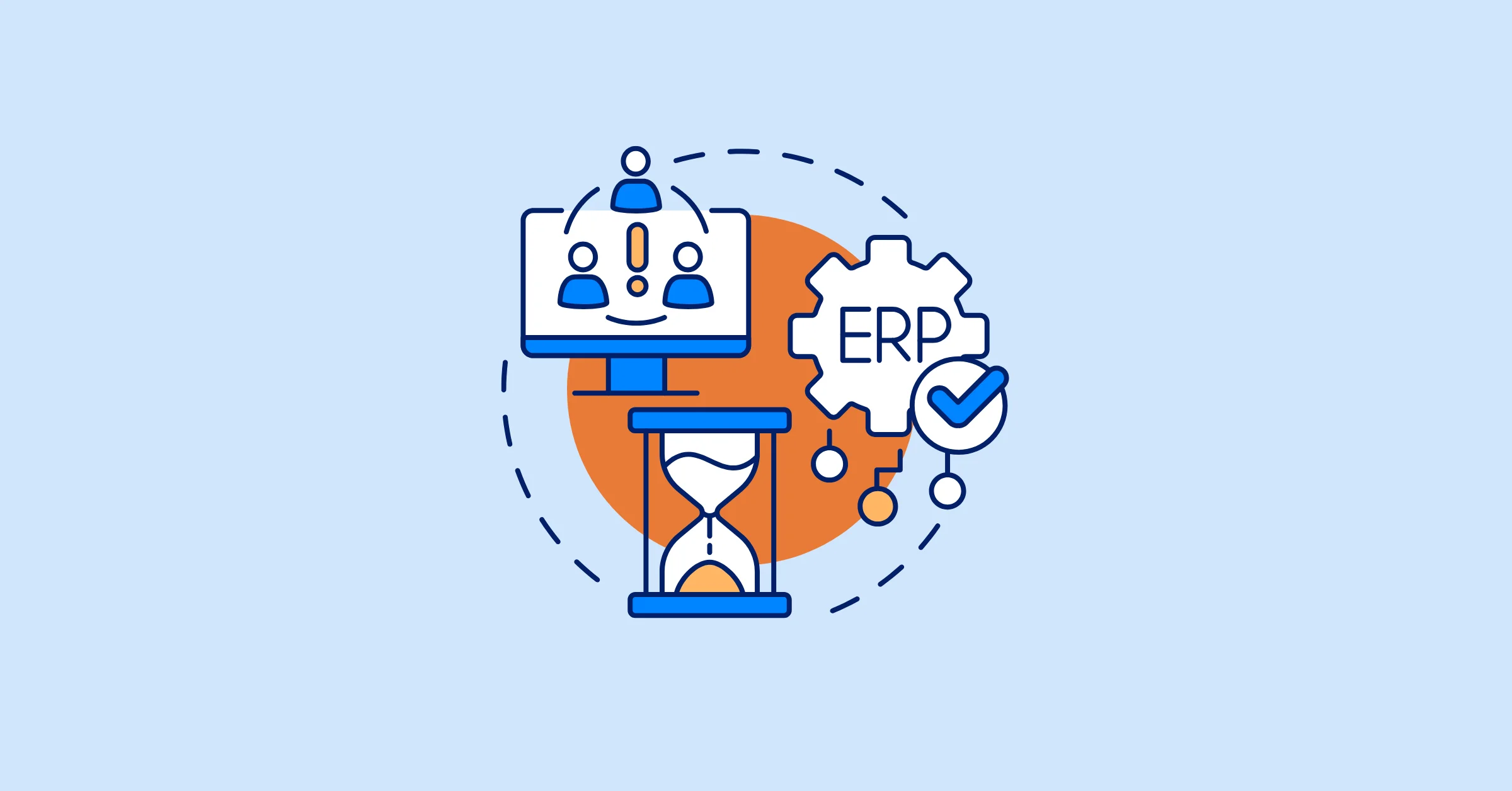How to Do Deep Work The Right Way to Boost Your Concentration
Learn how to master deep work to boost your focus and excel in resource management and planning with this practical guide.
Resource management and planning professionals juggle complex tasks like allocating budgets, scheduling teams, and forecasting needs. With constant notifications, meetings, and distractions, staying focused can feel like a losing battle. Deep work offers a powerful solution, enabling you to dive into demanding tasks with clarity and precision.
This guide provides a clear, practical roadmap to mastering deep work, tailored for resource management professionals, to help you boost concentration and optimize project outcomes.
What Is Deep Work?
Deep work, a term coined by Cal Newport in his book Deep Work: Rules for Focused Success in a Distracted World, is the practice of focusing intensely on cognitively demanding tasks without distractions. Unlike shallow work, such as routine tasks like answering emails or attending meetings, deep work involves immersive concentration, producing high-quality results in less time. For resource managers, deep work is perfect for tasks like analyzing capacity data, forecasting resources, or developing strategic allocation plans, fostering clear thinking in a distraction-heavy world.
What Is Resource Planning?
Resource planning is the strategic process of identifying, allocating, and managing resources, such as people, budgets, and tools, to ensure project success. It involves assessing resource needs, scheduling tasks based on team availability, and monitoring usage to prevent overallocation or burnout. Effective resource planning optimizes team capacity, reduces costs, and keeps projects on track.
For a deeper dive into resource planning essentials and best practices, read our full article on What is Resource Planning.
Why Deep Work Matters for Resource Management and Planning
Resource management and planning require organizing time, budgets, and team members to meet project goals. These tasks demand sharp focus and attention to detail, which deep work supports. Whether you’re forecasting resource needs or balancing team schedules, deep work helps you:
- Make better decisions by analyzing data without interruptions.
- Work efficiently by reducing errors in plans or budgets.
- Solve complex problems, like optimizing limited resources or managing workloads.
Studies show distractions can cut productivity by up to 40 percent. For resource managers, this can lead to mistakes in allocation or project delays. Deep work keeps you focused, ensuring accurate and effective resource planning.
Core Principles of Deep Work
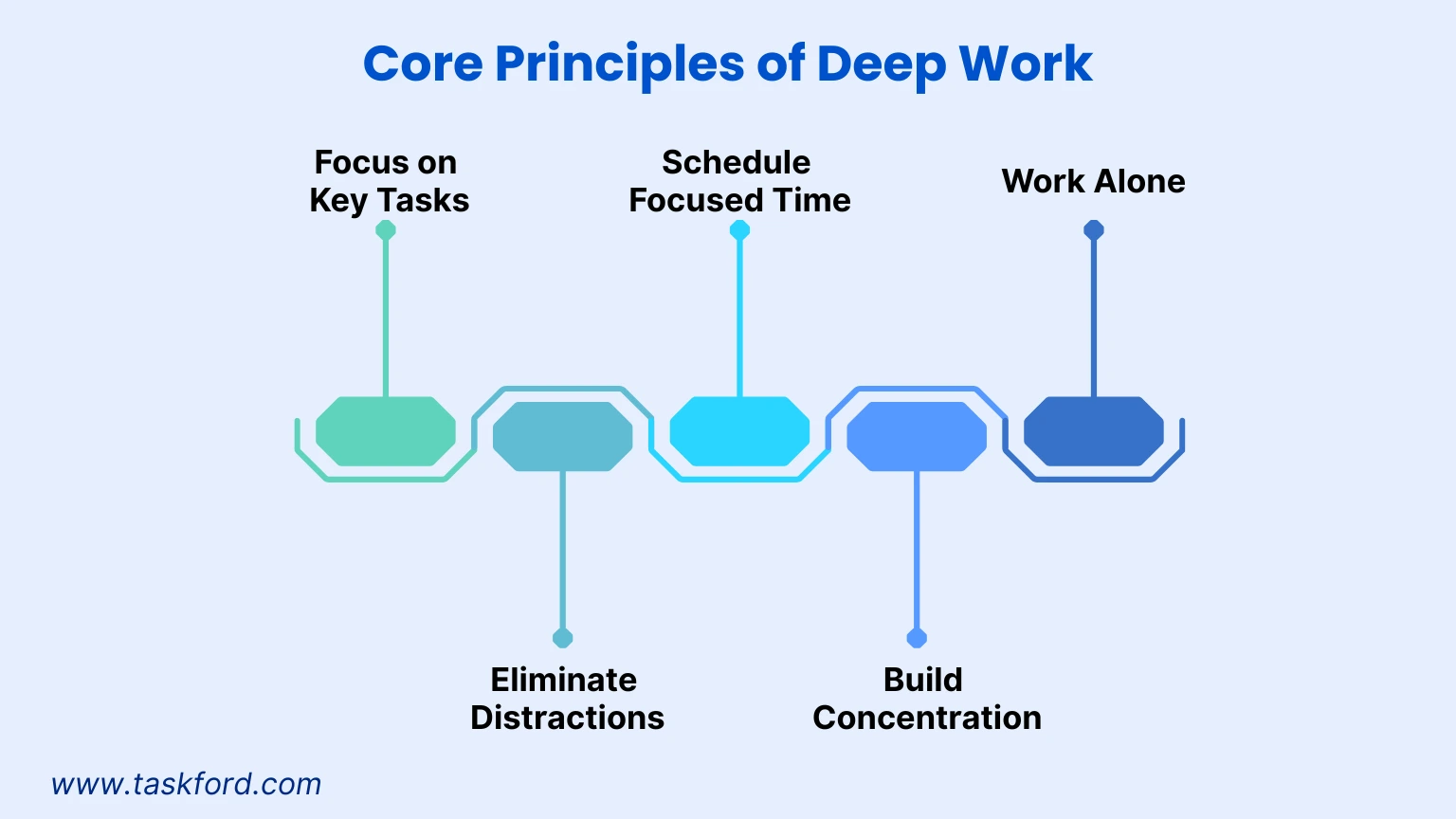
To apply deep work to resource management, follow these simple principles:
- Focus on Key Tasks: Prioritize high-impact tasks, like creating a resource allocation plan or analyzing team capacity.
- Eliminate Distractions: Turn off notifications and avoid interruptions to stay focused.
- Schedule Focused Time: Set aside specific hours for deep work to tackle complex planning tasks.
- Build Concentration: Practice focusing for longer periods to handle demanding projects.
- Work Alone: Find a quiet space to analyze budgets or forecast resources without distractions.
How to Do Deep Work for Resource Management: A Simple Guide
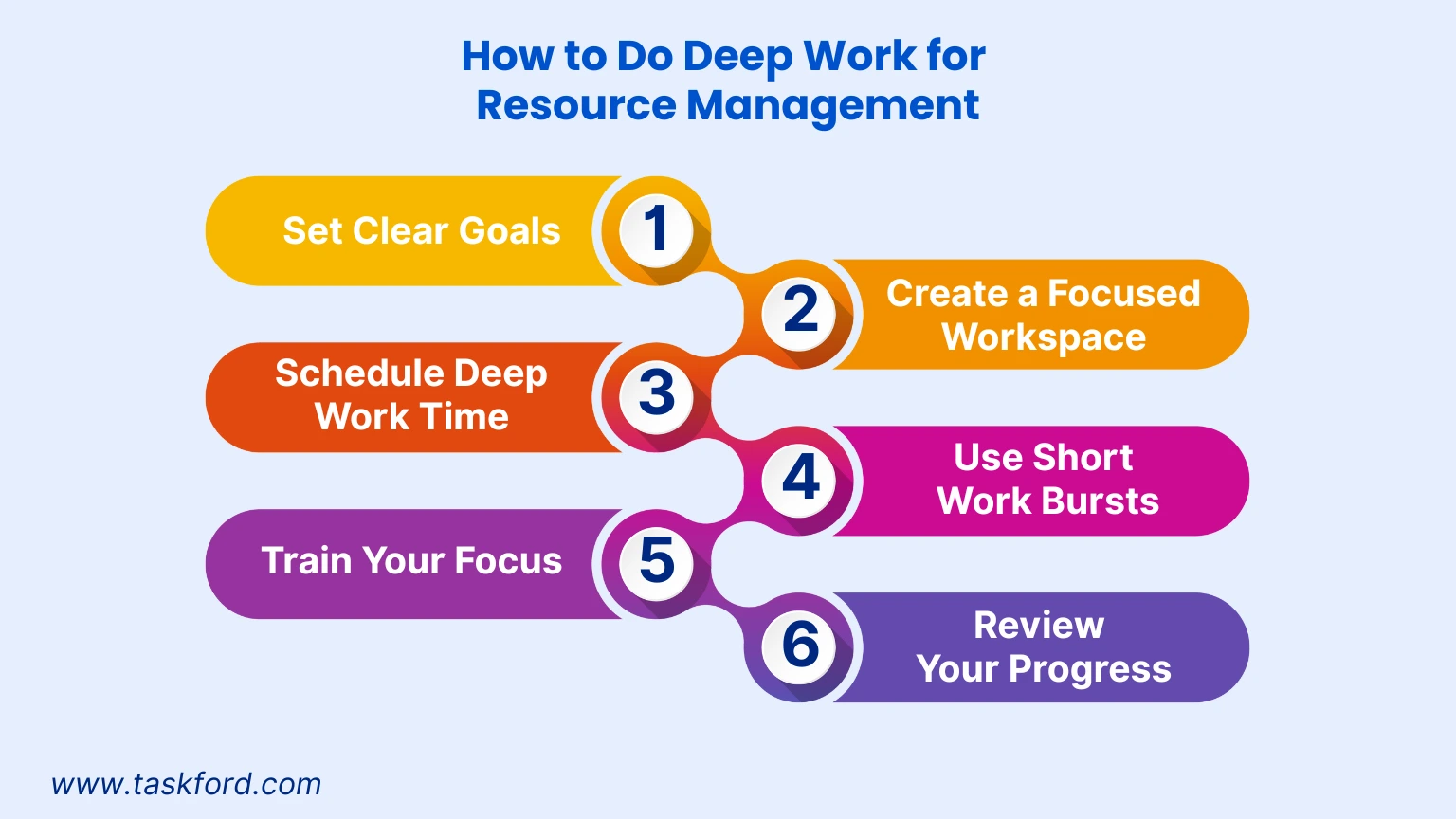
Step 1: Set Clear Goals
Define specific goals for your deep work sessions. Clear goals keep you focused. For example, instead of “work on planning,” set a goal like “create a resource allocation plan for Project X by Thursday” or “analyze team capacity for next quarter.” Specific goals make it easier to prioritize tasks and track progress.
Step 2: Create a Focused Workspace
Your environment affects your ability to concentrate. Set up a space that supports deep work:
- Block digital distractions: Turn off notifications on your phone and computer. Use apps like Freedom to block distracting websites during work sessions.
- Choose a quiet area: Work in a clutter-free space, like a private office or a corner with headphones, to focus on tasks like budget analysis.
- Set boundaries: Tell your team when you’re focusing. For example, share your schedule to avoid interruptions during planning.
A distraction-free space is key for tasks like forecasting resources, where details matter.
Step 3: Schedule Deep Work Time
Time is a valuable resource, and managing it well is critical. Plan deep work sessions during your most productive hours, often in the morning. Set aside 1 to 3 hours for tasks like resource allocation or schedule planning.
Here’s a sample schedule for a resource manager:
- 8:00 AM to 8:30 AM: Review goals and prioritize tasks.
- 8:30 AM to 10:30 AM: Deep work on analyzing resource data.
- 10:30 AM to 10:45 AM: Take a short break.
- 10:45 AM to 12:30 PM: Deep work on drafting a team schedule.
- 12:30 PM to 1:30 PM: Lunch and rest.
- 1:30 PM to 3:00 PM: Handle emails or meetings.
Protect this time by saying no to non-urgent meetings or requests.
Step 4: Use Short Work Bursts
The Pomodoro Technique is a time management method that helps maintain focus by breaking work into short,timed intervals. Work for 25 minutes, then take a 5-minute break to rest. After four sessions, take a longer break of 15 to 30 minutes. This approach prevents mental fatigue and keeps you sharp during tasks like reviewing budgets or forecasting needs. Use a timer or app, such as Pomodoro Tracker, to track your sessions.
Step 5: Train Your Focus
Concentration improves with practice. Try these tips to build your focus:
- Work on one task: Focus on a single task, like analyzing resource data, without checking emails or messages.
- Practice mindfulness: Spend 5 minutes daily meditating to improve your ability to stay focused.
- Limit low-value tasks: Spend less time on emails or minor tasks to save energy for important work like resource planning.
Step 6: Review Your Progress
At the end of each week, check how your deep work sessions went. Ask yourself:
- How many hours did I spend on deep work?
- What tasks did I complete, like finishing a resource plan?
- What distracted me, and how can I avoid it next time?
This review helps you improve your focus and manage time better, just like you manage project resources.
Overcoming Common Challenges
Resource managers face unique obstacles in deep work. Here’s how to address them:
- Team Interruptions: Resource planning often involves teamwork, which can lead to interruptions. Share your deep work schedule with your team. For example, block off focus time in your calendar and let colleagues know you’re unavailable unless it’s urgent.
- Struggling to Focus: If you lose focus during tasks like data analysis, start with short sessions of 25 minutes. Write your main task on a note, like “finish resource forecast,” and keep it visible to stay on track.
- Too Many Tasks: Resource managers often handle multiple projects. Focus on high-priority tasks first, like creating a budget for a key project. Use tools like Asana to organize tasks and prioritize effectively.
Use these tools to make deep work easier for resource management:
- Resource Management Software: Tools like Monday.com or Smartsheet help you track resources, monitor team capacity, and plan projects, freeing up mental space for deep work.
- Time-Tracking Apps: Tools like Toggl Track help you schedule and track deep work sessions, ensuring you allocate time effectively.
- Focus Apps: Apps like Focus@Will provide background music to help you concentrate on tasks like forecasting or scheduling.
Benefits of Deep Work for Resource Management
Using deep work for resource management offers clear benefits:
- Fewer mistakes: Focused time reduces errors in budgets or schedules.
- Better strategies: Deep work helps you develop creative solutions, like optimizing resource use or balancing team workloads.
- Faster results: Completing tasks in less time frees up resources for other priorities.
For example, a resource manager who spends two focused hours analyzing team capacity can spot issues early, saving time and effort later.
How TaskFord Supports Deep Work for Resource Management
TaskFord, an advanced project management and resource planning tool, is designed to simplify workflows and support focused work for resource managers. Its features align with deep work principles by helping you organize tasks and resources efficiently, allowing you to concentrate on high-value activities. Here’s how TaskFord’s key features support deep work:
- Resource and Capacity Planning: TaskFord provides visibility into team capacity and workloads. During deep work sessions, you can focus on analyzing data to allocate resources effectively, ensuring balanced schedules without overloading team members.
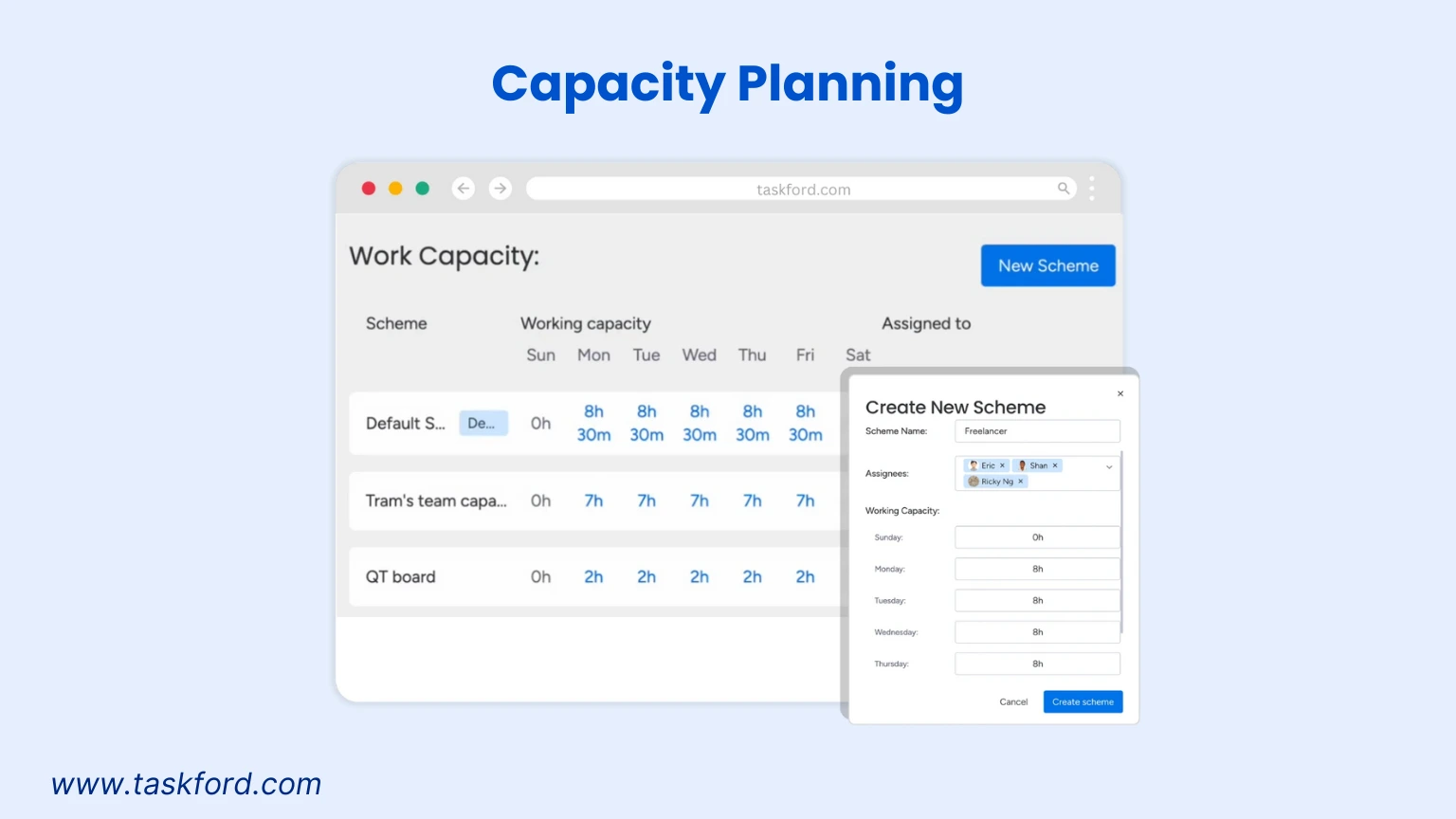
- Task Management with Flexible Views: TaskFord offers Kanban, Calendar, List, and Table views to organize tasks. Use the Kanban view to prioritize resource planning tasks or the Calendar view to schedule project milestones, keeping your focus on critical work.
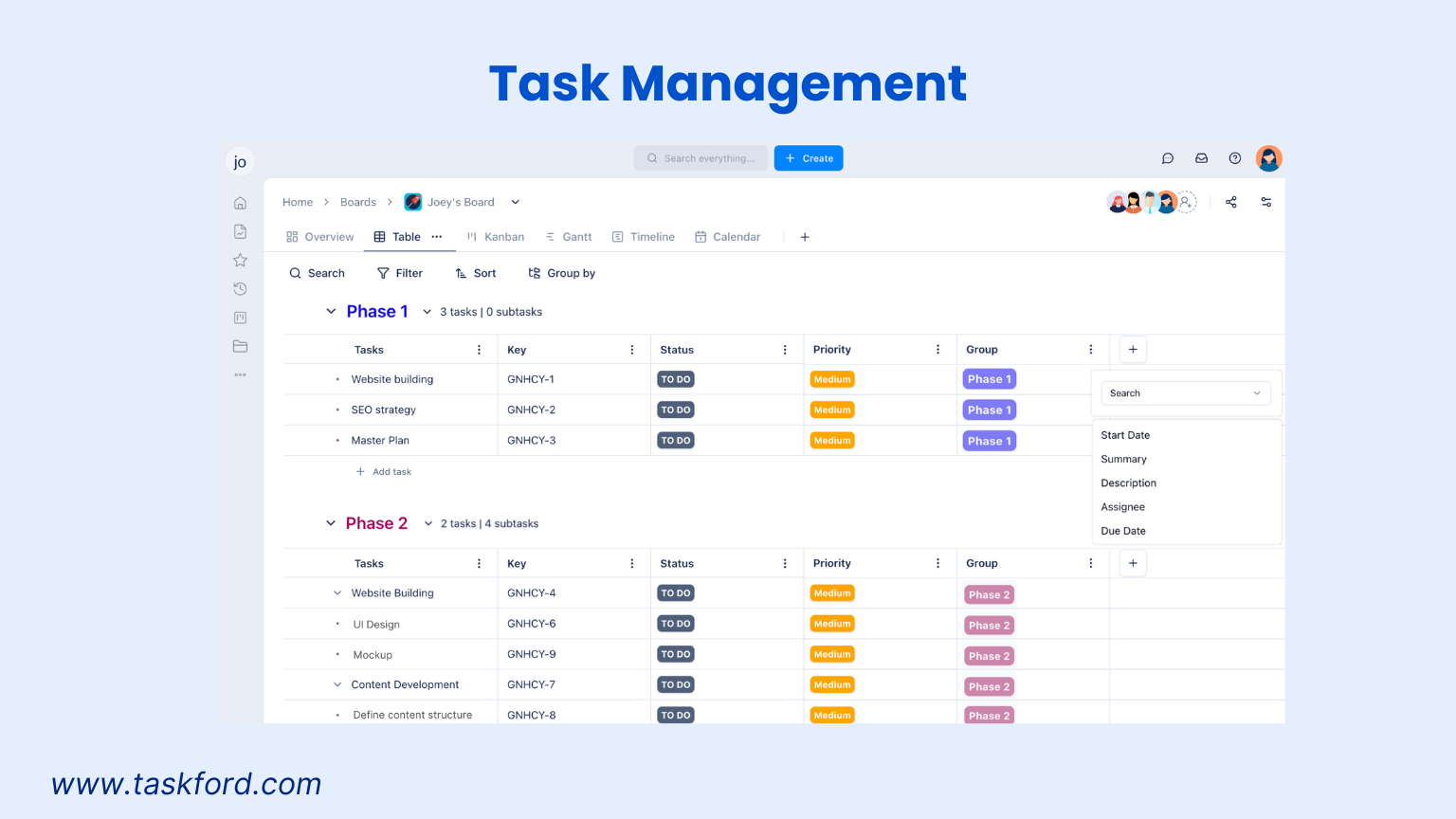
- Time Tracking and Cost Management: TaskFord’s time-tracking tools let you log hours and monitor project budgets. This supports deep work by enabling you to dedicate sessions to reviewing resource costs or ensuring projects stay within budget.
![]()
- Gantt Charts and Task Dependencies: TaskFord’s Gantt charts help visualize project timelines and task dependencies. This feature allows you to focus on long-term planning, such as mapping resource needs for multi-phase projects, without distractions.

- Leave Management: TaskFord simplifies leave tracking, ensuring team availability aligns with project schedules. During deep work, you can plan around absences to maintain smooth resource allocation.
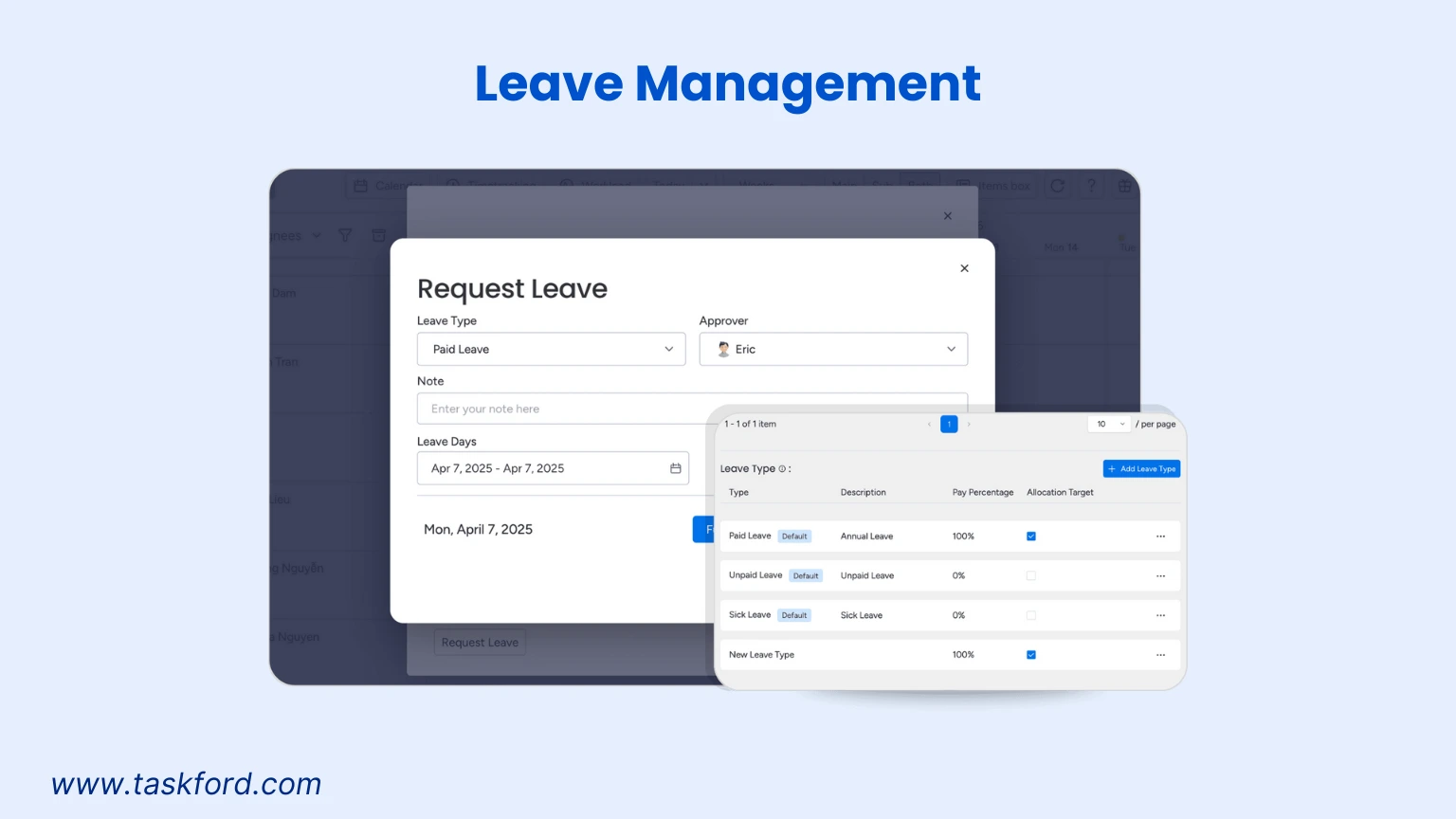
Conclusion
Deep work is a powerful tool for resource management and planning professionals. By focusing on key tasks, removing distractions, scheduling dedicated time, and building your concentration, you can work more effectively and achieve better results. Whether you’re forecasting resources, scheduling teams, or managing budgets, deep work helps you stay sharp and make smarter decisions.
Start by trying one deep work session this week. Pick a task like resource forecasting, set aside an hour, and eliminate distractions. With practice, deep work will become a habit, helping you manage resources with greater accuracy and efficiency.
Learn more
- Crafting a Resource Management Plan: A Project Manager's Handbook
- Lack Of Resources? 7 Smart Ways to Deliver Results Anyway
- What Is Resource Breakdown Structure (RBS)? The Ultimate Guide for Project Managers
Making work simpler,
smarter, and more connected
Join our waitlist and be notified first.

Related Blog
Subscribe for Expert Tips
Unlock expert insights and stay ahead with TaskFord. Sign up now to receive valuable tips, strategies, and updates directly in your inbox.

